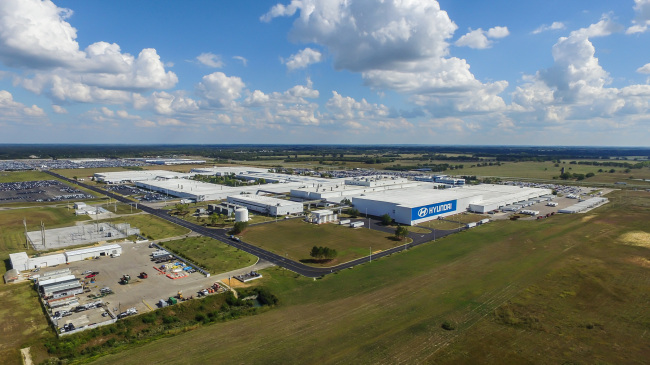Despite the slowing sales and heated competition in the US auto market, Hyundai Motor plans to increase its investment there in the next five years, with its expanding operations forecast to impact the local economy.
Chung Jin-haeng, CEO of the South Korean carmaker, said in January that the company would invest $3.1 billion in the US by 2021, 30 percent more than the $2.1 billion it has poured into America since 2012 when the bilateral free trade agreement between the two countries went into effect.
Chung also said the company would consider building a new plant, if demand for cars increases in the market.
Hyundai’s investments have so far contributed to creating around 100,000 private sector jobs in the carmaker’s manufacturing and supply, research and development, as well as dealership operations.
Of the total, approximately one-fifth -- or 20,000 -- are related to the automaker’s direct employment in its manufacturing-related activities in the US. Hyundai Motor Group operates two plants in Georgia and Alabama and another in Nuevo Leon in Mexico.
The size of local employment has been growing bigger year by year, mainly due to the company’s decision to adopt a three-shift work system, a Hyundai official in Seoul said.
 |
Workers at the Alabama plant conduct a final checkup. (Hyundai Motor) |
Hyundai Motor hired 7,881 regular workers in North America in 2015, a 20 percent increase from 6,558 a year before, he said.
Describing Hyundai’s investment plan in US as a “greenfield” type, a Trade Ministry official here said the strategy appears to have had a significant impact on the local economy. Greenfield investment refers to investments made on facilities in a new market that had no such facilities before.
According to a 2011 study jointly conducted by Hyundai and the Center for Automotive Research, Hyundai and its affiliate Kia account for more than one-third of the South Korean direct investment and capital spending in the US. Such investment has contributed $7 billion to the country’s gross domestic product.
“The study confirms that Hyundai’s expanding US operations are creating and retaining jobs, thereby having a significant impact on the country’s economy,” said Kim Hill, director of sustainability and economic development strategies at CAR, in the report. “US auto industry jobs that are related to Hyundai tend to be very well compensated, leading to higher than average household spending and tax payments impacts.”
 |
Hyundai Motor's Alabama plant (Hyundai Motor) |
Hyundai has also been expanding its corporate social responsibility programs for the local community.
To further improve its performance and image in the US market, Hyundai has been running a charity funding program that awards major grants to research centers seeking treatments and cures for pediatric cancer.
Since 1998, the fund has raised over $115 million.
Separately, Hyundai’s sister company Kia has partnered with the teen driving school Be Responsible And Keep Everyone Safe, or B.R.A.K.E.S., to educate future drivers on the importance of road safety.
And with the renewed investment plan -- $3.1 billion by 2021 -- market expectation is growing over the South Korean carmaker’s role in improving Korea-US trade ties.
Hyundai Motor Vice Chairman Chung Eui-sun will accompany South Korean President Moon Jae-in to a summit with US President Donald Trump. Chung, the heir apparent of the South Korean auto giant, left for the US ahead of the summit last week to seek a breakthrough in Hyundai’s sluggish sales in US. The industry has its eye on Chung’s US visit, with some raising the possibility of him making a surprise announcement while in the US.
By Cho Chung-un (
christory@heraldcorp.com)






![[Exclusive] Hyundai Mobis eyes closer ties with BYD](http://res.heraldm.com/phpwas/restmb_idxmake.php?idx=644&simg=/content/image/2024/11/25/20241125050044_0.jpg)
![[Herald Review] 'Gangnam B-Side' combines social realism with masterful suspense, performance](http://res.heraldm.com/phpwas/restmb_idxmake.php?idx=644&simg=/content/image/2024/11/25/20241125050072_0.jpg)

